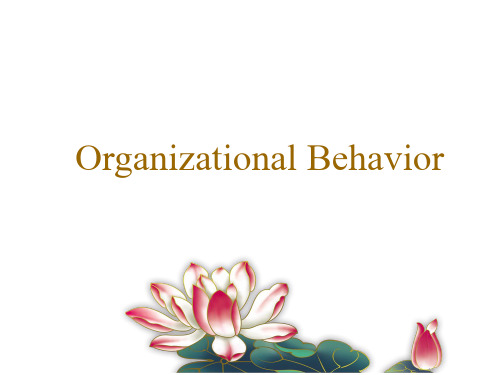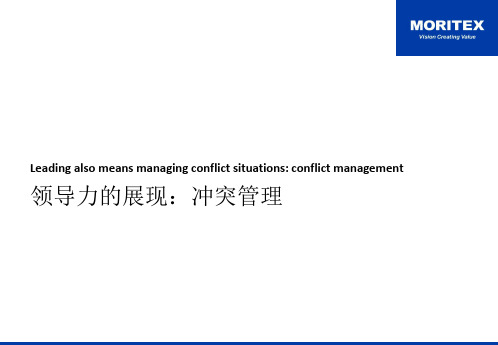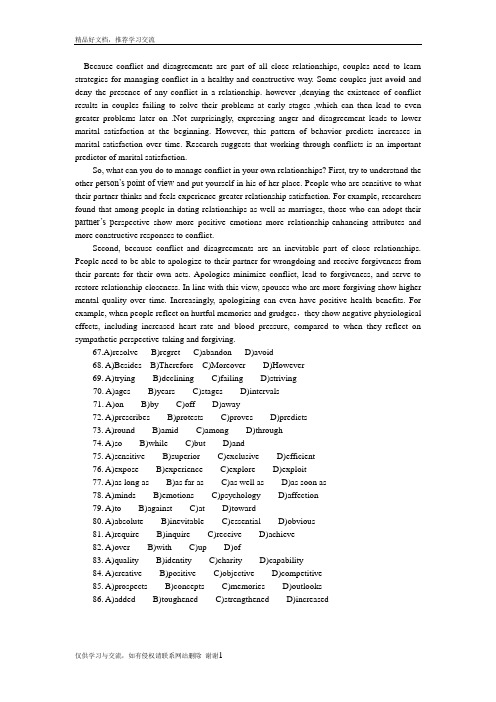Unit 7 Managing Conflict
- 格式:doc
- 大小:62.00 KB
- 文档页数:21



Because conflict and disagreements are part of all close relationships, couples need to learn strategies for managing conflict in a healthy and constructive way. Some couples just avoid and deny the presence of any conflict in a relationship. however ,denying the existence of conflict results in couples failing to solve their problems at early stages ,which can then lead to even greater problems later on .Not surprisingly, expressing anger and disagreement leads to lower marital satisfaction at the beginning. However, this pattern of behavior predicts increases in marital satisfaction over time. Research suggests that working through conflicts is an important predictor of marital satisfaction.So, what can you do to manage conflict in your own relationships? First, try to understand the other p erson’s point of view and put yourself in his of her place. People who are sensitive to what their partner thinks and feels experience greater relationship satisfaction. For example, researchers found that among people in dating relationships as well as marriages, those who can adopt their partner’s p erspective show more positive emotions more relationship-enhancing attributes and more constructive responses to conflict.Second, because conflict and disagreements are an inevitable part of close relationships. People need to be able to apologize to their partner for wrongdoing and receive forgiveness from their parents for their own acts. Apologies minimize conflict, lead to forgiveness, and serve to restore relationship closeness. In line with this view, spouses who are more forgiving show higher mental quality over time. Increasingly, apologizing can even have positive health benefits. For example, when people reflect on hurtful memories and grudges,they show negative physiological effects, including increased heart rate and blood pressure, compared to when they reflect on sympathetic perspective-taking and forgiving.67.A)resolve B)regret C)abandon D)avoid68. A)Besides B)Therefore C)Moreover D)However69. A)trying B)declining C)failing D)striving70. A)ages B)years C)stages D)intervals71. A)on B)by C)off D)away72. A)prescribes B)protests C)proves D)predicts73. A)round B)amid C)among D)through74. A)so B)while C)but D)and75. A)sensitive B)superior C)exclusive D)efficient76. A)expose B)experience C)explore D)exploit77. A)as long as B)as far as C)as well as D)as soon as78. A)minds B)emotions C)psychology D)affection79. A)to B)against C)at D)toward80. A)absolute B)inevitable C)essential D)obvious81. A)require B)inquire C)receive D)achieve82. A)over B)with C)up D)of83. A)quality B)identity C)charity D)capability84. A)creative B)positive C)objective D)competitive85. A)prospects B)concepts C)memories D)outlooks86. A)added B)toughened C)strengthened D)increased因为冲突和分歧的一部分,所有密切的合作关系,夫妻需要学习在一个健康的和建设性的方式来管理冲突的策略。


六年级下册英语第二单元课文讲解全文共3篇示例,供读者参考篇1Unit 2: Living in HarmonyIn this unit, students will learn about living in harmony with the environment, animals, and each other. This unit focuses on the importance of respect, kindness, and cooperation in maintaining a peaceful and safe world.Lesson 1: Protecting the EnvironmentIn this lesson, students will learn about the importance of protecting the environment. They will explore ways in which they can reduce, reuse, and recycle to help preserve the Earth's resources. They will also learn about the impact of pollution and deforestation on the environment, and the importance of conservation efforts.Lesson 2: Animal RightsIn this lesson, students will learn about animal rights and the importance of treating animals with kindness and respect. They will discuss the ethical treatment of animals in captivity, such asin zoos and circuses, and the importance of protecting endangered species. Students will also explore ways in which they can help animals in need, such as volunteering at animal shelters or supporting animal conservation organizations.Lesson 3: Resolving ConflictIn this lesson, students will learn about conflict resolution and the importance of communication, empathy, and compromise in resolving disputes. They will explore strategies for managing conflicts peacefully and constructively, such as active listening, assertiveness, and problem-solving. Students will also learn about the negative impact of bullying and explore ways to promote kindness and empathy in their interactions with others.Overall, this unit emphasizes the importance of living in harmony with the environment, animals, and each other. By fostering respect, kindness, and cooperation, students can contribute to a more peaceful and sustainable world for all living beings.篇2Unit 2: JobsIn this unit, students will learn vocabulary related to various jobs and professions. They will also practice using present simple tense to describe someone’s job and daily routines.Vocabulary:1. doctor – a person who treats sick people2. teacher – a person who teaches students in school3. firefighter – a person who puts out fires4. musician – a person who plays music5. chef – a person who cooks food professionally6. police officer – a person who maintains law and order7. pilot – a person who flies an aircraft8. engineer – a person who designs and constructs machinery or buildingsGrammar:1. Present Simple Tense- The present simple tense is used to talk about habits, routines, and general truths.- Affirmative form: Subject + base form of the verb (e.g. He reads books.)- Negative form: Subject + do/does + not + base form of the verb (e.g. She does not play soccer.)- Question form: Do/Does + subject + base form of the verb?(e.g. Do you like swimming?)Now let’s read a dialogue between two friends, Sarah and Kate, who talk about their parents’ jobs.Sarah: Hi Kate, what does your mom do?Kate: She’s a doctor. She works at the hospital.Sarah: That’s cool. My dad is a firefighter. He saves people’s lives.Kate: Wow, that’s amazing! What about your mom?Sarah: She’s a teacher. She loves working with children.Kate: That’s great. Do they w ork long hours?Sarah: Yes, they do. My dad works shifts, and my mom stays at school until late.Activities:1. Role-play: Divide students into pairs and ask them to create dialogues using the vocabulary and grammar structures learned in this unit. They can talk about their own family members’ jobs or create fictional characters.2. Jobs matching game: Prepare cards with pictures of different jobs and ask students to match the job names with the pictures. This will help reinforce their vocabulary.3. Daily routines worksheet: Provide students with a worksheet where they have to write sentences about their daily routines using the present simple tense. This will help them practice using the grammar structure in context.By the end of this unit, students should be able to confidently talk about different jobs and use the present simple tense to describe someone’s job and daily routines. Practice and repetition are key to mastering these concepts, so encourage students to engage in various activities to solidify their understanding.篇3Unit 2 of the sixth grade English textbook is titled "My Family and Friends." In this unit, students will learn vocabulary related to family members and friends, practice using possessive pronouns,and read short passages about other people's families and friends. In this article, we will provide a comprehensive explanation of the text in this unit.The first text in this unit is about a girl named Mia and her family. The passage describes Mia's family members, including her parents, grandparents, and younger sister. Students will have a chance to practice using possessive pronouns such as "her" and "their" to talk about the relationships between the family members. The text also introduces some common adjectives that can be used to describe people's appearances and personalities.The second text in this unit is about Mia's best friend, Sarah. The passage describes Sarah's family, including her parents, younger brother, and cousin. Students will have an opportunity to practice using possessive pronouns in the context of talking about friends and their families. The text also includes some vocabulary related to friendship and activities that friends can do together.The third text in this unit is a dialogue between Mia and Sarah. In this dialogue, the two friends talk about their families and friends, using possessive pronouns to describe them. Students will have a chance to practice listening to and speaking English in a conversational context.To help students better understand the text, teachers can use various activities and exercises. For example, students can practice using possessive pronouns in sentences, play family and friend-themed games, or create a dialogue between two characters using the vocabulary and structures from the unit.In conclusion, Unit 2 of the sixth grade English textbook is a valuable resource for teaching students about family and friends. By reading the texts, practicing vocabulary and grammar structures, and engaging in fun activities, students can improve their English skills and deepen their understanding of relationships with others.。

2024年6月大学英语六级听力原文(第1套)Conversation OneThank you for meeting with me, Stephen, at such a short notice.Not a problem, Margaret.Now please give me some good news. Have you agreed to my last proposal?I have indeed and I wish to sign the agreement, pending one small change to be made a contract.Margaret, we've been through this for almost a year now, back and forth making alterations.Are you sure you want to make a sponsorship deal for your clients or not?I ask this because frankly, some people at my end are running out of patience.I understand your concerns, but as I'm sure you understand, we hold our clients' best interests to be of the utmost concern.We therefore comb through the fine details of all contracts.Rest assured we all appreciate your firm's patience.Okay, fine. So what changes do you wish to make?Essentially, we would like the new deal to exclude the Middle East. That's all.The Middle East? Why?My client has a couple of other prospective marketing deals from companies in the Middle East.Those offers, should they materialize, would exclusively employ my client's image in the Middle East only.Therefore, in order to avoid any conflict, we would need to ensure that both marketing campaigns do not overlap geographically.What business sector in the Middle East are we talking about here?Real estate. Well, that should be okay then.So long as the product is very different from our food and beverage market, there should be no conflict of interest.Nevertheless, I will have to run this through my people.I don't foresee any problem, though.The Middle East is a negligible market for us.But I still need to check this with a couple of departments.Question 1. What does the woman say she will do?Question 2. What does the man say about some people he represents?Question 3.What reason does the woman give for the new deal to exclude the Middle East?Question 4. What does the man say about the Middle East?Conversation TwoNext, we have a special science-related new story. Paula Hancock isat the Denver Observatory.Paula, what is the big story over there?Hi, John. Yes, all the astronomers on site here are very excited.In fact, space enthusiasts all across North America and the rest of the Northern Hemisphere will be congregating on mountain tops tonight to watch the night's sky.Why? What's the big event? Is there an eclipse happening soon?Tonight, the Earth will come into close proximity with the Oppenheimer comet.It is the closest our planet has been to such a phenomenon in over 100 years.For this reason, it is expected that thousands of people will gaze up at the sky tonight in order to see this formidable object.How far away is this comet? Will people be able to see it with the naked eye?The Oppenheimer comet will still be millions of miles away on the edge of our galaxy.But nevertheless, this is a relatively close distance, close enough for people to observe in good detail through a telescope.People will only see a blur without one.However, that does not mean one needs professional equipment.Even the most ordinary of telescopes should be conducive for people to observe and wonder at this flying object.Many of our viewers will be wondering how they too can take part in this once-in-a-lifetime event.Where will this comet be in the sky? How can people find it?The comet will be almost exactly due north, at 60 degrees above the equator.However, finding the comet is indeed very tricky.And scientists here have told me there are plenty of phone apps that will facilitate this.How fantastic! Thank you, Paula, for the information.Question 5.What does the woman say about all the astronomers at the Denver Observatory?Question 6.What do we learn from the conversation about the Oppenheimer comet?Question 7. What does the woman say people will only see in the sky without a telescope?Question 8.What do scientists at the Denver Observatory advise amateurs do to facilitate their observation?Passage OneDietary guidelines form the basis for nutrition advice and regulations around the world.While there is strong scientific consensus around most existing guidelines, one question has recently stirred debate: should consumers be warned to avoid ultra-processed foods?Two papers published today in the American Journal of Clinical Nutrition outline the case for and against using the concept of "ultra-processed foods" to help inform dietary guidelines, beyond conventional food classification systems.The authors, Carlos Monteiro of the University of Sao Paulo and Arna Ostrup of Novo Nordisk Foundation, will discuss the issue in a live virtual debate, August 14th, during NUTRITION 2024 Live Online.The debate centers around a system developed by Monteiro and colleagues that classifies foods by their degree of industrial processing, ranging from unprocessed to ultra-processed.The system defines ultra-processed foods as those made using sequences of processes that extract substances from foods and alter them with chemicals in order to formulate the final product.Ultra-processed foods are characteristically designed to be cheap, tasty, and convenient.Examples include soft drinks and candy, packaged snacks and pastries, ready to heat products, and reconstituted meat products.Studies have linked consumption of ultra-processed foods, which are often high in salt, sugar, and fat, with weight gain and an increased risk of chronic diseases, even after adjusting for the amount of salt, sugar, and fat in the diet.While the mechanisms behind these associations are not fully understood, Monteiro argues that the existing evidence is sufficient to justify discouraging consumption of ultra-processed foods in dietary recommendations and government policies.Question 9. What question is said to have recently stirred debate?Question 10.How does the system developed by Monteiro and colleagues classify foods?Question 11.What is consumption of ultra-processed foods linked with, according to studies?Passage TwoBelieve it or not, human creativity benefits from constraints.According to psychologists, when you have less to work with, you actually begin to see the world differently.With constraints, you dedicate your mental energy to acting more resourcefully.When challenged, you figure out new ways to be better.The most successful creative people know that constraints give their minds the impetus to leap higher.People who invent new products are not limited by what they don't haveor can't do.They leverage their limitations to push themselves even further.Many products and services are created because the founders saw a limitation in what they use.They created innovation based on what was not working for them at the moment.Innovation is a creative person's response to limitation.In a 2015 study which examined how thinking about scarcity or abundance influences how creatively people use their resources, Ravi Mehta at the University of Illinois and Meng Zhu at Johns Hopkins University found that people simply have no incentive to use what's available to them in novel ways.When people face scarcity, they give themselves the freedom to use resources in less conventional ways because they have to.Obstacles can broaden your perception and open up your thinking processes.Consistent constraints help you improve the connecting unrelated ideas and concepts.Marissa Meyer, former vice president for search products and user experience at Google, once wrote in a publication on Bloomberg, "Constraints shape and focus problems and provide clear challenges to overcome; creativity thrives best when constrained."Question 12.What do psychologists say people do when they are short of resources?Question 13. What does the passage say about innovation?Question 14. What did a 2015 study by Ravi Mehta and Meng Zhu find?Question 15.What did Marissa Meyer once write concerning creativity?Recording OneDifferent people use different strategies for managing conflicts.These strategies are learned in childhood.Usually, we are not aware of how we act in conflict situations.We just do whatever seems to come naturally.But we do have a personal strategy, and because it is learned, we can always change it by learning new and more effective ways of managing conflicts.When you get involved in a conflict, there are two major concerns you have to take into account: achieving your personal goals and keeping a good relationship with the other person.How important your personal goals are and how important the relationship is to you affect how you act in a conflict.Given these two concerns, five styles of managing conflicts can be identified.1. The turtle.Turtles withdraw into their shells to avoid conflicts.They give up their personal goals and relationships.They believe it is easier to withdraw from a conflict than to face it.2. The shark.Sharks try to overpower opponents by forcing them to accept their solution to the conflict.They seek to achieve their goals at all costs.Sharks assume that conflicts are settled by one person winning and one person losing.Winning gives sharks a sense of pride and achievement.Losing gives them a sense of weakness, inadequacy, and failure.3. The teddy bear.Teddy bears want to be accepted and liked by other people.They think that conflict should be avoided in favor of harmony, and believe that conflicts cannot be discussed without damaging relationships.They give up their goals to preserve the relationship.4. The fox.Foxes are moderately concerned with their own goals and about their relationships with other people.They give up part of their goals and persuade the other person in a conflict to give up part of his goals.They seek a solution to conflicts where both sides gain something.5. The owl.Owls view conflicts as problems to be solved.They see conflicts as improving relationships by reducing tension between two people.They try to begin a discussion that identifies the conflict as a problem.By seeking solutions that satisfy both themselves and the other person, owls maintain the relationship.Owls are not satisfied until a solution is found that achieves their own goals and the other person's goals, and they are not satisfied until the tensions and negative feelings have been fully resolved.Question 16.Why does the speaker say strategies for managing conflicts can always be changed?Question 17.What is said to affect the way one acts in a conflict?Question 18. Of the five styles the speaker discusses, which views conflicts as problems to be solved?Recording TwoThe genetic code of all 1.5 million known species of animals and plants living on Earth will be mapped to help save species from extinction andboost human health.Scientists hope that cracking the genetic code of plants and animals could help uncover new treatments for infectious diseases, slow aging, improve crops and agriculture, and create new bio-materials.In Britain, organisations including the Natural History Museum, the Royal Botanic Gardens at Kew and the Wellcome Sanger Institute have joined forces to sequence Britain's 66,000 species of animals and plants.Dubbed the Darwin Tree of Life Project, it is expected to take 10 years and cost 100 million pounds.Once completed, all the information will be publicly available to researchers.Many scientists believe that Earth has now entered the sixth mass extinction, with humans creating a toxic mix of habitation loss, pollution and climate change, which has already led to the loss of at least 77 species of mammals and 140 types of birds since 1500.It is the biggest loss of species since the dinosaurs were wiped out 66 million years ago.Scientists say that sequencing every species will revolutionize the understanding of biology and evolution, bolster efforts to conserve as well as protect and restore biodiversity.Dr. Tim Littlewood, head of Life Sciences Department at the Natural History Museum said, "Whether you are interested in food or disease, the history of how every organism on the planet has adapted to its environment is recorded in its genetic makeup.How you then harness that is dependent on your ability to understand it.We will be using modern methods to get a really good window on the present and the past.And of course, a window on the past gives you a prospective model on the future."Sir Jim Smith, Director of Science at Wellcome said, "Try as I might, I can't think of a more exciting, more relevant, more timely, or more internationally inspirational project.Since 1970, humanity has wiped out 60 percent of animal populations.About 23,000 of 80,000 species surveyed are approaching extinction.We are in the midst of the sixth great extinction event of life on our planet, which not only threatens wildlife species, but also imperils the global food supply.As scientists, we all realize we desperately need to catalogue life on our fragile planet now.I think we're making history."Question 19.What do scientists hope to do by cracking the genetic code of plants and animals?Question 20. What do many scientists believe with regard to Earth?Question 21.How does Sir Jim Smith, Director of Science at Wellcome, describe the Darwin Tree of Life Project?Recording ThreeJohn Donne, the English poet, wrote in the 17th century, "No man is an island, entire of itself; every man is a piece of the continent, a part of the main."Now, a British academic has claimed that human individuality is indeed just an illusion, because societies are far more interconnected at a mental, physical, and cultural level than people realize.In his new book, The Self Delusion, Professor Tom Oliver, a researcher in the Ecology and Evolution group at the University of Reading, argues there is no such thing as "self", and not even our bodies are truly "us".Just as Copernicus realized the Earth is not the center of the universe, Professor Oliver said society urgently needs a Copernican-like revolution to understand people are not detached beings but rather part of one connected identity."A significant milestone in the cultural evolution of human minds was the acceptance that the Earth is not the center of the universe, the so-called Copernican Revolution," he writes.However, we have one more big myth to dispose of: that we exist as independent selves at the center of a subjective universe.You may feel as if you are an independent individual acting autonomously in the world; that you have unchanging inner self that persists throughout your lifetime, acting as a central anchor-point with the world changing around you.This is the illusion I seek to tackle. We are intimately connected to the world around us."Professor Oliver argues there are around 37 trillion cells in the body but most have a lifespan of just a few days or weeks, so the material "us" is constantly changing.In fact, there is no part of your body that has existed for more than ten years.Since our bodies are essentially made anew every few weeks, the material in them alone is clearly insufficient to explain the persistent thread of an identity.Professor Oliver claims that individualism is actually bad for society, and only by realizing we are part of a bigger entity can we solve pressing environmental and societal problems.Through selfish over-consumption we are destroying the natural world and using non-renewable resources at an accelerating rate."We are at a critical crossroads as a species where we must rapidly reform our mindsets and behavior to act in less selfish ways," he said."So let's open our eyes to the hidden connections all around us."Question 22. What is indeed just an illusion according to Professor Tom Oliver?Question 23. What does Professor Tom Oliver think of the idea that we exist as independent selves at the center of a subjective universe?Question 24. Why does Professor Tom Oliver claim that the material "us"is constantly changing?Question 25. How can we solve pressing environmental and societal problems according to Professor Tom Oliver?。
U n i t S e v e n M a n a g i n g C o n f l i c t disagreement, quarrel, argument, clash, confrontationhandledeal with, cope withsuppressprevent sth from growing, developing or continuingeliminateget rid of, removedysfunctionalabnormal, not working in a satisfactorywaytime-consuming / energy-consuming be a sign ofshow, representconfrontation (contront)arise fromcome from / stem from / result from lead tocauseadaptation(adapt, adaptable, adaptability adapt oneself to / be adapted to e.g.This film is adapted from a novel. This novel is adapted for a film. survival (survive)the survival of the fittestThe fittest survive.compete (with sb) for sth scarce / limited resources hallmarkfeature or qualitydifferentiation (differ, differentiate) in terms ofin aspects oforientation programformalitycorrect and formal behavior likelihood (likely)possibilityin all likelihoodmost probablymechanismsystemintegratecombine, include …so they work togethercohesivefo rming a united wholedistortion (distort)twisting, giving a false account of sth division (divide)a major unit or section of an organization; departmentsuspect (suspicion, suspicious)doubt (doubtful)seek outlook for, find outBirds of (the same) feathers flock together.stereotypeform a fixed idea about a person or thing which may not really be true 对…形成模式化(或类型化)的看法subordinatesupervisordefine…(as …)definitionorganization chartjob description (describe)(sb/sth) slip through the crack/net: (an organization or a system) fail to find or remember sb/sth and deal with them(漏网,被漏掉,被遗忘)e.g.Write the name down so that you remember or it will slip through the crack (be forgotten).overlapcover part of the same area of interest, knowledge, responsibility, etc.jurisdictionthe authority that an official organization has to make legal decisions about sb/sthambiguousvague, not clearpotential (n.)possibilityat the expense ofat the cost ofoccurrence (occur)(be) made up ofconsist ofcommunication barriertrade barrierday / night shiftassociation (associate) (… with …) participation (in)(participate, participant, participative) consensusagreement in opinionsomehow (adv.)in a certain wayliteraturewriting or printed information on a particular subjectabound with/in (abundant, abundance) exist in large numbersin abundanceboil down to sth(of a situation, problem, etc.) have sth as a main or basic part(il)legitimate(un)lawful, (il)legalbestowgive sth to sbinevitablebring about cause, generatecompliance (comply) obedience (obey) comply withinvolve (doing) sthrespond to …in response tomajority / minority rulewarrant (v.t.)make sth necessary or appropriate interpret (interpreter, interpretation) explaininterpret … as …entirely: completelycompromiseassumption (assume)beliefa loaf of bread side payment in exchange for favordo sb a favor extensively widelyat great costsubmit to / submit…toneutral (neutrality, neutralize) labor disputearbitration (arbitrate, arbitrator) disputant (dispute)resolution (resolve)have sth in commondistinction (distinct, distinctive) mutual needs / helpattainment (attain)depersonalize(often passive) to make sth less personal so that it does not seem as if human beings with feelings and personality are involvedobjective (adj.)subjective (adj.)conflict orientedconcentrate on / focus on …dramaticallyexplicitly (implicitly)clearly and directlystimulate (stimulation)on the part of sb / on one’s part super-ordinatehigher in rank or position‘The problem-solving …presenting these as problems to be solved.’ultimatelyfinallydirect … (your effort) to / towards …be directed to/towards …remindremind sb of sthvital(ly)commitment (commit)devotionobjective (n.)‘… what they are really saying to the parties involved is …’acceptable (accept)(be) acceptable to sbarrive at …reach an agreementdictate (dictation)tell sb what to do; order …with the force of authorityE x e r c i s e s:IV. Translation1.Up till now, the whole matterboiled down to a power strugglebetween the trade union and thedirectors in the company.2.In recent years, local industryhas developed rapidly, but at theexpense of historical and culturalstructures in that area.3.Many problems discussed at themeeting arose from a lack ofcommunication.4.His conscientious attitudetoward work stems from a strongsense of responsibility.5.Write the name down so that youremember or it’ll slip throughthe crack/net.6.Some experts suggest thatprivate schools should beintegrated into the nationaleducational system.7.The lose-lose strategy is aproblem-solving technique thatboth sides have to adopt at greatcost.8.We need help with researchprojects in exchange for free useof all the lab apparatus / equipment.。